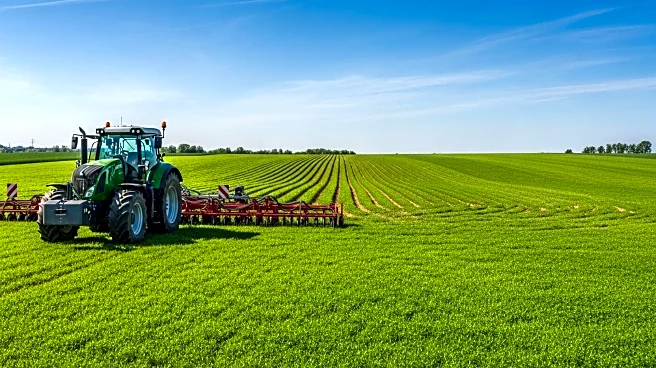What's Happening?
Agriculture Secretary Dr. Mohammad Emdad Ullah Mian has assured that Bangladesh has sufficient fertilizer stock until December, negating any crisis for the current season. During a visit to agricultural fields in Rajshahi and Chapainawabganj districts, he emphasized the importance of creating awareness among farmers to increase crop yields through judicious fertilizer use. The government has launched the 'Khamari App' to assist farmers in reducing fertilizer costs and increasing yields. This app provides information on crop types, required fertilizer, and seed quantities, potentially saving farmers around Taka 1,000 per bigha in fertilizer costs for paddy and increasing yields by about one maund (40 kg) per bigha.
Why It's Important?
The assurance of no fertilizer crisis is crucial for Bangladesh's agricultural sector, which is a significant part of the country's economy. The introduction of the 'Khamari App' represents a technological advancement that could lead to increased efficiency and productivity in farming. By reducing costs and increasing yields, farmers can improve their livelihoods and contribute to the country's food security. This development also highlights the government's commitment to supporting agricultural innovation and sustainability, which is vital for long-term economic growth and environmental conservation.
What's Next?
The continued implementation of fertilizer guidelines through the 'Khamari App' is expected to enhance agricultural productivity in Bangladesh. The government may focus on promoting less-irrigation consuming cereal crops to mitigate water scarcity issues in drought-prone areas like Barind. This shift could lead to more sustainable farming practices and better water resource management. Stakeholders, including farmers and agricultural officials, are likely to monitor the app's impact on crop yields and cost savings closely.
Beyond the Headlines
The technological integration in agriculture through the 'Khamari App' could set a precedent for other developing countries facing similar challenges. It underscores the potential of digital tools in transforming traditional farming practices and addressing resource constraints. Additionally, the focus on less-water consuming crops could influence future agricultural policies, promoting sustainability and resilience against climate change impacts.










